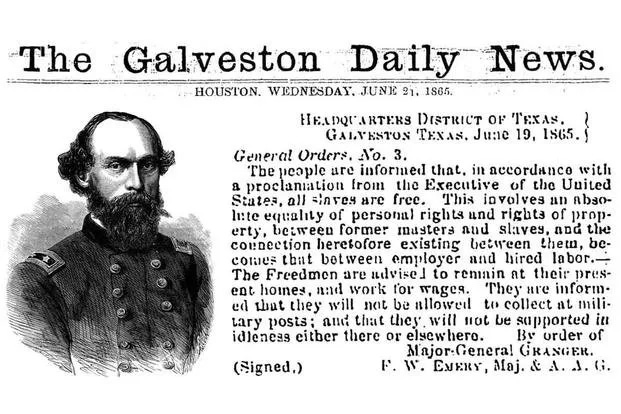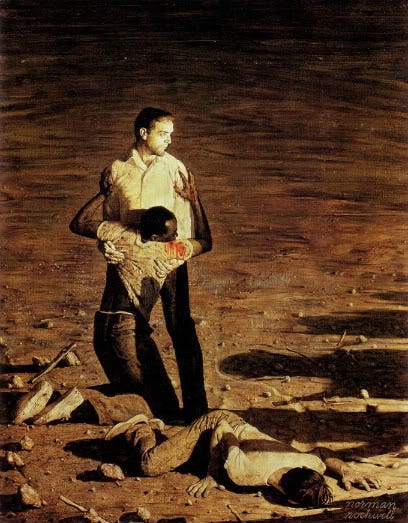After Juneteenth
Slavery Ended, but Continued Racism and Violence mean that its Promise is Not Fully Fulfilled
Yesterday was the 159th anniversary of Juneteenth, the day that Federal Troops landed in Galveston to officially reestablish Federal control over the rebellious state of Texas, lately a member of the rebel Confederate States. On June 18th 1865 a force of Federal soldiers, four regiments of battle hardened U.S.C.T. ( U.S. Colored Troops) landed In Galveston and captured the city. The next day, General Gordon Granger the Commanding Officer of the new Military District of Texas, issued General Order #3, ending slavery in Texas, the final act in fulfilling the Emancipation Proclamation.
The armies of Robert E. Lee and Joseph Johnson had surrendered two months before in Virginia and North Carolina respectively. Federal troops caught Confederate President Jefferson Davis on May 10th near Irwindale, Georgia, and on May 26th the Confederacy’s last major military command, General Kirby Smith’s Department of the Trans-Mississippi surrendered. All that remained was for Federal troops to take control of the areas of the Confederacy not occupied, the last being Texas.
The Confederacy might have surrendered and slavery officially ended, but violence perpetrated against newly free Blacks continued, as did slavery by another name, that of the Black Codes, which came into being in late 1865 and 1866. These laws allowed Blacks without a job or residence to be charged with vagrancy and then rented out to former slave owners, often on the plantations where they had been enslaved. They were also rented out to railroads, iron mines, and as work crews. In all cases their lot was as bad as it had been under slavery. Additionally, violence against Blacks in the former Confederacy committed by the Ku Klux Klan and other terrorist paramilitaries killed thousands of Blacks, destroying their homes, churches, neighborhoods, and towns. Massacres were committed in Memphis and Vicksburg and the towns of Hamburg, South Carolina and Colfax, Louisiana were destroyed, and hundreds killed with the rest driven from their homes, Hamburg no longer exists. These paramilitaries also targeted the Reconstruction governments, assassinated Black politicians and other officials, as well as White politicians, teachers, and others trying to help Blacks.
Reconstruction ended in 1877 in a deal to elect Rutherford Hayes over Samuel Tilden in a highly disputed election. By 1890 almost all the gains achieved during Reconstruction were over. Decisions by the U.S. Supreme Court including Cruikshank v. United States (1876) which limited the protections offered by the 14th Amendment to direct actions of government officials or agencies freeing the terrorist paramilitaries and private citizens to do their worst. In the Civil Rights Cases (1883) the Supreme Court in an 8-1 decision struck down the Equal Protection Clause in the 14th Amendment saying that while it prohibited discrimination by state and local governments that the Federal Government did not have the power to prohibit discrimination by private individuals or organizations. It also stated that while the 13th Amendment ended “the badge of slavery” it did not prevent racial discrimination in public accommodations. In 1894 the Court ruled in Plessy v Ferguson that segregation as legal so long as “separate but equal” accommodations were provided. This led to decades of segregation and discrimination, not only in the former Confederate states, but throughout the United States, and even after Plessy was overturned in the 1954 Brown v. Board of Education decision, governors in many Southern States worked to continue segregation, and many Christian schools were founded so White children would not have to attend school with Black children. One of the early leaders of this movement was the late Jerry Falwell.
Violence against Blacks continued during the 1950s and 1960s especially attacks on Civil Rights workers and leaders, including the assassinations of leaders like Medgar Evers, the Rev. George Lee, and the Reverend Martin Luther King Jr. Many others were brutally murdered during the same time period. Perhaps the most infamous occurred 60 years ago today. Three young civil rights workers, in Philadelphia, Mississippi. James Cheney, Andrew Goodman, and Michael (Mickey) Schwerner were investigating the burning of a Black Church which was active in voter registration.
Goodman, Schwerner, and Chaney were marked men from the moment they arrived in Philadelphia. As they left the town the three were arrested for an alleged traffic violation. They were briefly jailed and released that evening, but were not allowed to make any phone calls. On the way back to Meridian, two carloads of Klan members forced their car off the road and then abducted them and murdered them. The bodies were not discovered for 44 days when they were found buried in an earthen dam. Their disappearance brought national attention and a major investigation to the town. Eventually seven men, including Deputy Cecil Price were convicted of the murders. The murders and the investigation became the subject of the movie Mississippi Burning. The iconic American artist Norman Rockwell depicted the slayings in his painting Southern Justice.
Juneteenth needs to be a rallying point where we as Americans recommit to the ideals of the Declaration that “we hold these truths to be self-evident, that all men are created equal and endowed by their Creator with certain unalienable rights, among them, life, liberty, and the pursuit of happiness”; and Lincoln’s words at Gettysburg which can be quite appropriately extended to all the other fallen in the war, including the African American soldiers whose sacrifices for liberties that they often did not enjoy benefited every American and those oppressed by Nazis, Communists, and other tyrants around the world.
Though it became a Federal holiday in 2021 when President Joe Biden signed the Juneteenth National Independence Day Act into law and most states recognize it, there are some which do not allow it as a holiday even though they still recognize the birthdays of Robert E. Lee and Jefferson Davis. Likewise, some now prohibit teaching almost anything to do with Black history in order not to offend the descendants of slaver owners, Klansmen and other unpleasant characters. Florida under Governor Ron DeSantis has led the way in this.
The violence continues, the discrimination continues, and the Republican Party MAGA Movement is working to roll back voting rights, education, healthcare, and employment advances designed to bring Blacks and other racial minorities an equal opportunity for what White people, especially those well off who feel threatened by equality for those with darker skin than them.
Please excuse my extended absence from writing. The past few months have been difficult. My mother died and we had to travel to California for her memorial which combined with my doctoral studies and completing the school year where I teach sucked the life out of me. I would sit down to write and hit the wall. That being said, I am back and expect more.
If you are interested in learning more about what I touched on in this article please get a copy of my book, Mine Eyes Have Seen the Glory: Religion and the Politics of Race in the Civil War Era and Beyond. It is available here for the $75 founders subscription, as well as through the publisher, Potomac Books of the University of Nebraska Press, Amazon, and many other retailers. The link to Amazon is here, please note that the price there fluctuates wildly from the publisher’s price to whatever they sell it for on a given day.
Mine Eyes Have Seen the Glory (Amazon)
https://www.amazon.com/Mine-Eyes-Have-Seen-Glory/dp/1640124888/ref=sr_1_1?crid=3HH7O8PS7IBFH&dib=eyJ2IjoiMSJ9.1u4VFU9mzD6tQtjemCvP2Dru535rfgjOCOVx9a8OilbwPIhS5PCTQblQQQ19yifLzksWsUp5uDdF6nzGh6pkpg.0RIUDtnu4KQge3OLI-mYQLUDkY1ysvP8SvAc_WLpi-g&dib_tag=se&keywords=mine+eyes+have+seen+the+glory+dundas&qid=1719026906&sprefix=Mine+eyes+have+%2Caps%2C90&sr=8-1







So pleased to you have found time to share your thoughts on Substack. You were missed!
Thank you Anita. It was hard. Many conflicted feelings with her passing. She was a great mom when I was growing up and my dad was in the Navy deployed to Vietnam or traveling to shipyards to get new ships ready. Later she became a very mean spirited and cruel woman. We somewhat reconciled and I find myself missing calling her to listen to her whining and blather. Totally weird. Because of being in the military I always had a 2000-7000 mile buffer zone, my poor brother, a school principal lived less than a mile from her and she about wore him down emotionally. My brother is a gem. Thank you again.